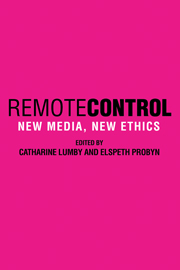Book contents
- Frontmatter
- Contents
- List of Contributors
- Acknowledgements
- 1 Introduction: An Ethics of Engagement
- 2 Real Appeal: The Ethics of Reality TV
- 3 Arguing about Ethics
- 4 ‘Their own media in their own language’
- Beyond the Disconnect: Practical Ethics
- 5 A Viable Ethics: Journalists and the ‘Ethnic Question’
- 6 Ethics, Entertainment and the Tabloid: The Case of Talkback Radio in Australia
- Money versus Ethics
- 7 Eating into Ethics: Passion, Food and Journalism
- Beyond Food Porn
- 8 Ethics impossible? Advertising and the Infomercial
- Pitching to the ‘Tribes’: New Ad Techniques
- 9 Diary of a Webdiarist: Ethics Goes Online
- 10 Control-SHIFT: Censorship and the Internet
- Representing the Asylum Seekers
- 11 The Ethics of Porn on the Net
- Ethics and Sex
- 12 Grassroots Ethics: The Case of Souths versus News Corporation
- 13 Great Pretenders: Ethics and the Rise of Pranksterism
- The Limits of Satire
- Index
1 - Introduction: An Ethics of Engagement
Published online by Cambridge University Press: 18 December 2009
- Frontmatter
- Contents
- List of Contributors
- Acknowledgements
- 1 Introduction: An Ethics of Engagement
- 2 Real Appeal: The Ethics of Reality TV
- 3 Arguing about Ethics
- 4 ‘Their own media in their own language’
- Beyond the Disconnect: Practical Ethics
- 5 A Viable Ethics: Journalists and the ‘Ethnic Question’
- 6 Ethics, Entertainment and the Tabloid: The Case of Talkback Radio in Australia
- Money versus Ethics
- 7 Eating into Ethics: Passion, Food and Journalism
- Beyond Food Porn
- 8 Ethics impossible? Advertising and the Infomercial
- Pitching to the ‘Tribes’: New Ad Techniques
- 9 Diary of a Webdiarist: Ethics Goes Online
- 10 Control-SHIFT: Censorship and the Internet
- Representing the Asylum Seekers
- 11 The Ethics of Porn on the Net
- Ethics and Sex
- 12 Grassroots Ethics: The Case of Souths versus News Corporation
- 13 Great Pretenders: Ethics and the Rise of Pranksterism
- The Limits of Satire
- Index
Summary
A PRINCESS DRIVEN TO HER DEATH BY MANIACAL PAPARAZZI; REALITY shows where contestants cry, vomit and have sex on screen; radio hosts showered with vats of cash for editorial comment; an online world teeming with pornographers and Nazis; media moguls putting the boot into rugby league fans – in the past decade, media ethics have rarely been out of the media.
In their diversity and difference, the concerns raised by popular new media genres challenge the conventional framing of media ethics. Certainly the intensity, reach and variety of media formats today are unprecedented. From global news channels clogged with talking heads dissecting instantaneous satellite feeds to online web sites featuring people who live their entire life in front of a camera, our screens, magazines and airwaves are filled with images of what living is like. Driven by technological advances, increased competition, and the globalisation of capital and information flows, our contemporary mass media present the viewer, the reader and the Internet user at home with a host of ethical challenges.
Meanwhile, public debate brims with popular and scholarly commentators announcing the decline, degradation and even extinction of media ethics. In conventional terms, the story of the media is one of moral and professional decline, a tale of the steady erosion of codes and ideals which once guided mainstream journalistic practice and media production. And yet, as anyone who's worked in the media can attest, codes of ethics and journalistic ideals have always had a tenuous relationship with the messy realities of professional practice.
- Type
- Chapter
- Information
- Remote ControlNew Media, New Ethics, pp. 1 - 10Publisher: Cambridge University PressPrint publication year: 2003
- 1
- Cited by



